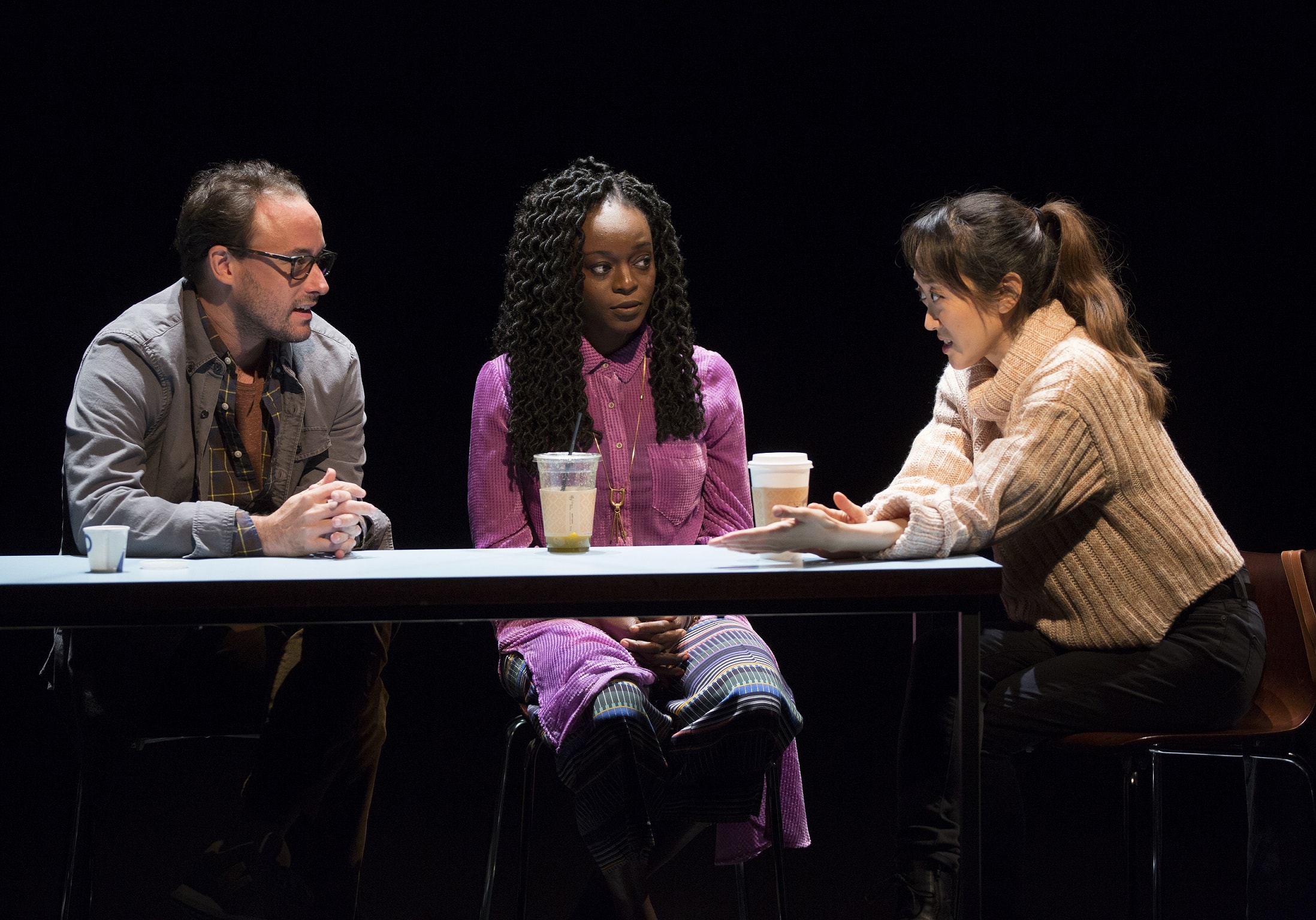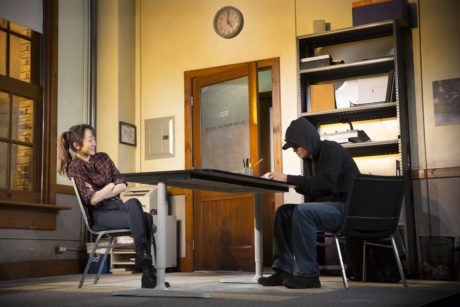The playwright Julia Cho now has Office Hour on at the Public Theatre, but she has been a steady and welcome contributor to the contemporary scene for some time. Works of hers have been produced at Playwrights Horizons, Roundabout Theatre Company, and the Vineyard, as well as at reputable regional theaters like the South Coast Rep, Berkely Rep and the Long Wharf in New Haven, among others. I hadn’t known her work until now, and I’m delighted to have at last become aware of this very gifted writer.

In Office Hour, she has transformed what could have been unwatchable material (too terrifying), or a lecture about the world’s current need to deal with disturbed men and women who want nothing but to kill, to expiate the rage they contain with them, into electrifying, gripping theater. In the simplest, most direct way, she created a small handful of characters whose every word hits home as truthful and topical. In a high school for disturbed youngsters, three teachers sit around a meeting room discussing what to do about a student named Dennis who refuses to utter a word, and insists on dressing in a black outfit that includes a hood that hides most of his face. He does show up at classes, but he has no contact ever with anyone. If anyone stares at him or even accidentally touches him, he often goes ballistic and is truly frightening. There has been no act of actual violence, but two of the three teachers insist that he be expelled for the security and safety of all. Only one of them, a teacher named Gina wins the right to have a go at the eighteen-year-old student, for she’s convinced she can get through to him. We spend most of the 90-minute play watching her work, and the progress she makes only gets her further into a quagmire that makes escape difficult.

The play holds us in its grip because Cho knows just how to spoon feed us with enough information to make us want more. When we get it, it’s always surprising, and to make this a thoroughly thrilling experience, rather than an interesting debate, she and her director Neel Keller leave the linear structure of the play now and then to show us what might happen, or might have happened, then thrusts us back into the present to continue the dance–is it a dance of death, or is it the finding of common ground for two human beings, one of whom is broken, possibly beyond repair.
The four actors are marvelous. In the first scene, Greg Keller and Adeola Role bring great individuality to their work as two teachers who know something must be done about their troubled student. It’s in the longer second scene that Sue Jean Kim and Ki Hong Lee brilliantly bear the burden of bringing the play home. Though Ms. Kim’s “Gina” may seem at times foolhardy for dealing with this unreachable student, her conviction is clear and I connected totally with her and I rooted for her to accomplish something meaningful. Greg Keller’s “Dennis” seems to have taken all of his 18 years to learn that power in the hands of the mentally disabled and physically weak can be tremendous, and when that power is unleashed, we have these current massacres, always seemingly without motive. But when probed, as is done here by this excellent writer, director, and cast, motive is clearly established. Office Hour is ripped from today’s headlines and dramatically puts us in touch with a subject I’m certain none of us wants to get to close to.
I’ve had a most nourishing week in theatre here in New York – Brigadoon, Harry Clarke and now Office Hour all offering delights for all the senses. And lots more promising entries waiting in the wings. The holiday season has begun with something for everyone.
Running Time: 90 minutes with no intermission.
Office Hour runs through December 3, 2017, at The Public – 425 Lafayette Street in New York, NY. For tickets, call the box office at (212) 212-539-8500, or purchase them online.





The setting of this play isn’t a “high school for disturbed youngsters”. It’s a college campus. That’s part of the reason it’s so hard to do anything about Dennis. He’s an adult, so contacting his parents is not an option. And he is entitled to freedom of speech (which is not actually true of students in high school) so his violent writings can’t be a reason for taking him out of a class.
The intellectual freedom of a college campus actually hinder the instructors from doing anything. Add to this the fact that they are all adjuncts, who’s positions are not guaranteed, and this poses an impossible problem for them.
There are numerous references to the fact that this is a college, not a high school. I was very surprised by this misunderstanding.
My apologies for misnaming the school. On one hearing, and knowing that the boy is 18, I assumed it was a high school. I don’t think that changes the thrust of the review however.
The instructors may be “hindered” but they do have the ability to spend time with the troubled student in the “office hour”, and whether it’s in a high school, college, or remedial institution
doesn’t seem to me to diminish the impact of the confrontation between teacher and student.